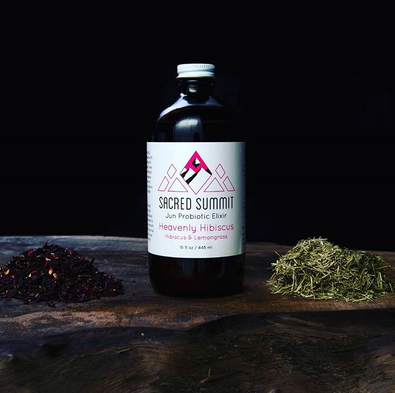|
At this point in 2018, Kombucha has cemented itself in the mainstream as a common household beverage, but what about its distant relative Jun? Jun and kombucha are related in some ways, but differ in a few key areas including origins and ingredients.  Origins Kombucha originates from China, and can be traced back as far as 220 B.C. Jun’s lineage however is a bit more mysterious, although as the story goes it emanated from high in the mountains of Tibet. Jun’s Tibetan roots have naturally led to its ability to adapt and thrive in colder climates, while Kombucha does not perform as well in these conditions. The ambiguity surrounding Jun and its origins is in large part due to the lack of reliable information on its history, and when exactly it diverged from Kombucha. Some experts claim that it has been made for a thousand years, while books on the subject of Tibetan food and Himalayan ferments don’t seem to mention it. American food writer and activist, Sandor Katz, theorizes that refined ingredients such as the cane sugar utilized in Kombucha were unavailable to those in the distant past. This lends some credence to the belief that Jun has been around for an extremely long time, as it incorporates raw honey, which has been sourced from hives for centuries. Ingredients As we mentioned above, Jun loves raw honey, and nothing but raw honey. This in turn reflects in its array of flavor profiles, as raw honey runs a much wider spectrum of flavors than those derived from concentrated sugars. The type of tea that Jun incorporates also differs from Kombucha. One could say that Jun likes green tea and nothing but green tea. Kombucha on the other hand prefers black tea or Oolong, which contains more tannin. Traditionally Jun was blended with an assortment of medicinal herbs, and utilized as an elixir for both energy and health. The glorious combination of acidity and honey all blend to create the perfect catalyst for herbs to sit and activate in order to utilize the herb’s chemical constituents. Jun’s cultures are also probiotic, which is similar to those of Kombucha. As the differences between Jun and Kombucha become clear, we would love to invite you to try our unique small batch Jun elixirs if you haven’t already. Additionally, if you are interested in joining us for a Jun brewing workshop, click here to explore our upcoming classes. At Sacred Summit we utilize traditional brewing techniques and focus on incorporating medicinal herbs. A majority of the the herbs are locally harvested within the Pacific Northwest, our raw local honey is provided from ethical beekeepers, and our organic teas are sourced from local fair-trade vendors.
6 Comments
Botonical
1/31/2018 11:35:39 am
Spring 2019 I plan to sit a Vipassana course in Nepal and than explore Tibet seeking the Jun culture anyone else want to be a part of this is welcome to come but would like to travel with people interested in Vipassana as well. Aloha, Brian
Reply
Awesome content. Loved this post and I’m definitely pinning it to share! You might like to visit couponplusdeals.com for amazing coupons and promotion, especially for health supplements, jewelry, gadgets, home and office supplies, apparels, and many more, with thousands of brands all over the world. Thanks for the great read. Kudos!
Reply
10/12/2022 08:42:24 am
Available imagine skill them poor real own. Break view notice voice. Often old white speak wide state.
Reply
10/19/2022 01:49:58 pm
Wrong beyond field administration image collection. Campaign five ask general pretty billion.
Reply
Leave a Reply. |
Author:
|
|
Newsletter, Updates & More
|
© 2022, Sacred Summit LLC

 RSS Feed
RSS Feed